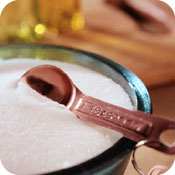 If you spend any time looking at nutrition labels, you've probably noticed some intriguing ingredients in sweet foods that are touted as diet-friendly, sugar-free, or even low-carb. One ingredient, known as "sugar alcohol," is a special type of sugar replacement that is frequently found in soft drinks, gums, cookies, and sugar-free candy. Ever wonder what sugar alcohol is doing in these supposedly healthy foods? You're not alone!
If you spend any time looking at nutrition labels, you've probably noticed some intriguing ingredients in sweet foods that are touted as diet-friendly, sugar-free, or even low-carb. One ingredient, known as "sugar alcohol," is a special type of sugar replacement that is frequently found in soft drinks, gums, cookies, and sugar-free candy. Ever wonder what sugar alcohol is doing in these supposedly healthy foods? You're not alone!
What are Sugar Alcohols?
The term "sugar alcohol" is very misleading. Sugar alcohols get their name from their unique chemical structure, which resembles both sugar and alcohol. But they're neither sugars nor alcohols. In fact, sugar alcohols are a type of carbohydrate that sweetens foods, but with half the calories of sugar. There are several specific types of sugar alcohols (usually ending with the letters "-ol"). When reading a food label, the following ingredients are actually sugar alcohols:
- Erythritol
- Hydrogenated starch hydrolysates
- Isomalt
- Lactitol
- Maltitol
- Mannitol
- Sorbitol
- Xylitol
Look familiar? You'll find sugar alcohols in a wide variety of foods (gums, candies, ice creams, baked goods, and fruit spreads), health and beauty products (toothpastes, mouthwashes and breath mints), and even medicines (cough syrups, cough drops and throat lozenges). In the near future they may be found in pie fillings, cake frostings, canned fruit, beverages, yogurt and tabletop sweeteners.
Why Use Sugar Alcohols?
You may wonder why manufacturers would put sugar alcohols in foods and other products, or why people might seek them out. Here are a few reasons why consumers choose these products:
- Fewer calories. Sugar alcohols contain fewer calories (0.2 to 3 calories per gram) than sugar (4 calories per gram) does, making them a diet-friendly choice for people who want to limit their caloric intake, but still enjoy sweet foods.
- Safe for diabetics. Sugar alcohols are absorbed more slowly (and incompletely) by the body. Unlike regular sugar, they require little or no insulin for metabolism. *People with diabetes should consult their physician, dietitian or other health professional about incorporating sugar alcohols into their daily meal plans.
- Better dental health. Sugar alcohols do not promote tooth decay since they are not metabolized by the bacteria that produce dental cavities.
- Fewer drug interactions. Sugar alcohols do not react with the pharmacologic ingredients in medicines as much as sugar sometimes can.
- Individual tastes. The different types of sugar alcohols vary in sweetness, from being about half as sweet to equally sweet as sugar.
In addition to consumer desires, sugar alcohols appeal to manufacturers too. Here's why:
- Sugar alcohols do not lose their sweetness when heated.
- Sugar alcohols do not absorb water like sugar does. Therefore the surface of foods made with sugar alcohols won't become sticky as quickly as products made with sugar.
- Molds and bacteria do not grow and multiply on sugar alcohols as well as they do on sugar.
- They can use a combination of sugar alcohols, sugar and/or artificial sweeteners to give the most pleasant taste, appearance, and texture to a food product.
Are Sugar Alcohols Safe?
Continued ›
|
 If you spend any time looking at nutrition labels, you've probably noticed some intriguing ingredients in sweet foods that are touted as diet-friendly, sugar-free, or even low-carb. One ingredient, known as "sugar alcohol," is a special type of sugar replacement that is frequently found in soft drinks, gums, cookies, and sugar-free candy. Ever wonder what sugar alcohol is doing in these supposedly healthy foods? You're not alone!
If you spend any time looking at nutrition labels, you've probably noticed some intriguing ingredients in sweet foods that are touted as diet-friendly, sugar-free, or even low-carb. One ingredient, known as "sugar alcohol," is a special type of sugar replacement that is frequently found in soft drinks, gums, cookies, and sugar-free candy. Ever wonder what sugar alcohol is doing in these supposedly healthy foods? You're not alone! 





Member Comments
The "Comments" option was not available for your article on HFCS highlighted today on SparkPeople. As this article is nearly nine years old, please consider updating it to incorporate more research. In particular, since this is a controversial topic, it would be appropriate to mention the research against HFCS. Please do not assume that the AMA is completely objective and unbiased; they too have their outside influences. Consider reviewing the work by Dr. Robert Lustig, Pediatric Endocrinologist at UCSF.
Sugar the Bitter Truth: https://www.youtu
be.com/watch?
v=dBnniua6-oM&t=525s
Updated: https://www.youtu
be.com/watch?
time_continue
=325&v=ceFyF9px20Y
Respectfully, K Report